HISTORY OF SALT

The earliest systematic exposition of the different kinds of salts, its uses, and the methods of its extraction was published in China around 2700 BCE.
Historians believe that Native Americans produced salt from salt springs more than 500 years before the arrival of Europeans. Salt produced by boiling brine supplied salt during the war of 1812.
COME ON MAN? WHY DO I NEED TO LEARN ABOUT SALT? DONT YOU JUST GO TO THE SUPERMARKET AND BUY A CONTAINER OF MORTON SALT. NO MY SON SALT HAS QUITE A HISTORY AND IF YOU PAY ATTENTION TO THE ZENTRAVELER YOU MIGHT LEARN SOMETHING? OR IF YOU WANT THE QUICK FIX SIMPLY THROW SALT OVER YOUR LEFT SHOULDER PRAY TO ONE GOD OR ALL OF THE GODS AND HOPE FOR THE BEST.

The simplest definition of salt is a naturally occurring crystalline compound, NaCl, sodium chloride existing as a mineral and an important constituent of seawater. Salt is used for seasoning food and also as a preservative. Studies show that there are around 1400 uses of salt.
Salt is vital for living. Human beings and animals need it for maintaining fluid balance and muscle and nerve functioning of the body. Too much or too little salt can cause serious malfunctioning of the body’s organs which can result in serious issues.
Salt is a mineral composed primarily of sodium chloride, a chemical compound belonging to the larger class of salts; salt in the form of a natural crystalline mineral is known as rock salt or halite. Salt is present in vast quantities in seawater.
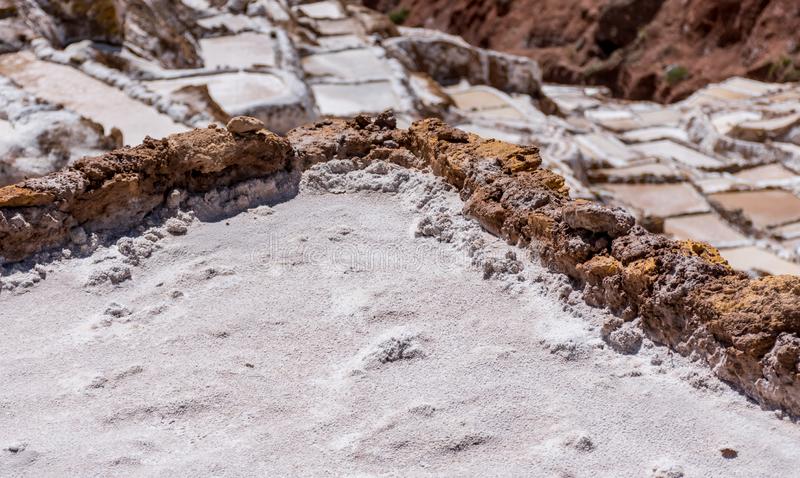
HISTORY OF SALT A TIMELESS INGREDIENT
As far back as 6050 BC, salt has been an important and integral part of the world's history, as it has been interwoven into countless civilizations. Used as a part of Egyptian religious offerings and valuable trade between the Phoenicians and their Mediterranean empire, salt and history have been inextricably intertwined for millennia, with great importance placed on salt by many different cultures. Even today, the history of salt touches our daily lives.
The word "salary" was derived from the word "salt." Salt was highly valued and its production was legally restricted in ancient times, so it was historically used as a method of trade and currency. The word "salad" also originated from "salt," and began with the early Romans salting their leafy greens and vegetables. Undeniably, the history of salt is both broad and unique, leaving its indelible mark in cultures across the globe.
Most people probably think of salt as simply that white granular seasoning found in saltshakers on virtually every dining table. It is that, surely, but it is far more. It is an essential element in the diet of not only humans but of animals, and even of many plants. It is one of the most effective and most widely used of all food preservatives. Its industrial and other uses are almost without number. Salt has great current interest as the subject of humorous cartoons, poetry and filmmaking.

The fact is that throughout history, salt—called sodium chloride by chemists—has been such an important element of life that it has been the subject of many stories, fables, folktales and fairy tales. It served as money at various times and places, and it has been the cause of bitter warfare. Offering bread and salt to visitors, in many cultures, is traditional etiquette. While records show the importance of salt in commerce in medieval times and earlier, in some places like the Sahara and in Nepal, salt trading today gives a glimpse of what life may have been like centuries ago.
Salt was in general use long before the beginning of recorded history, and dating back to around 2700 B.C. the earliest known treatise on pharmacology was published in China. A major portion of this writing is devoted to a discussion of more than 40 kinds of salt, including descriptions of two methods of salt extraction that are similar to processes used today.
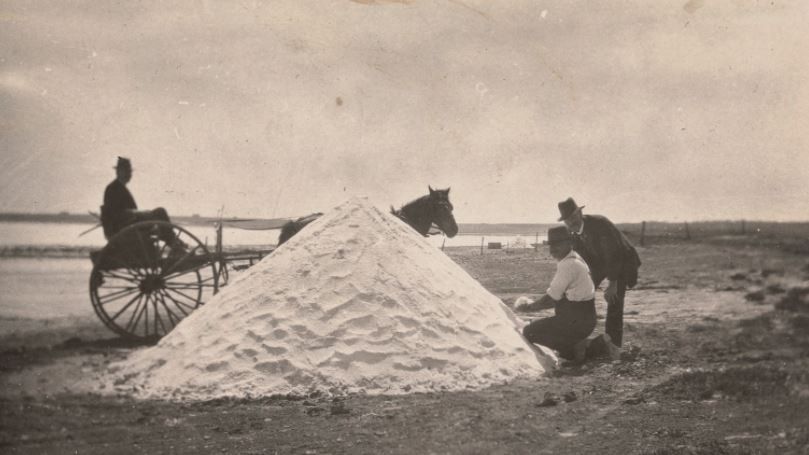
Salt production has been important in China for two millennia or more, and the Chinese, like many other governments over time, realized that taxing salt would could be a major revenue source. Nomads spreading westward were known to carry salt, and Egyptian art from as long ago as 1450 B.C. records salt making.
Salt was of crucial importance economically. The expression not worth his salt stems from the practice of trading slaves for salt in ancient Greece. Special salt rations given to early Roman soldiers were known as "salarium argentum," the forerunner of the English word "salary." References to salt can be found in languages around the globe, particularly regarding salt used for food. From the Latin "sal," for example, come such other derived words as "sauce" and "sausage." Salt was an important trading commodity carried by explorers.
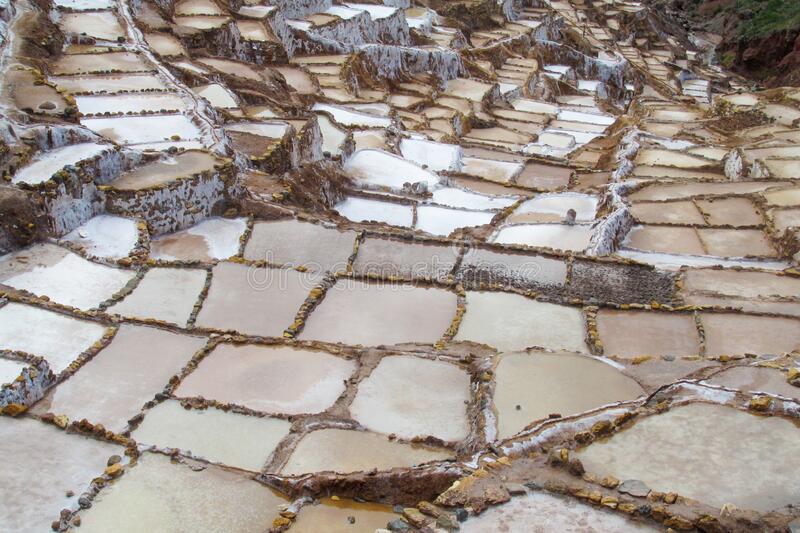
Salt has played a vital part in religious ritual in many cultures, symbolizing purity. There are more than 30 references to salt in the Bible, including the well-known expression "salt of the earth." Additionally, there are many other literary and religious references to salt, including use of salt on altars representing purity, and use of "holy salt" by the Unification Church.
Salt making encompasses much of the history of the United Kingdom, particularly in the Cheshire area. Medieval European records document salt making concessions. In continental Europe, Venice rose to economic greatness through its salt monopoly. Salt making was important in the Adriatic/Balkans region as well (the present border between Slovenia and Croatia); in Bosnia-Herzegovina, Tuzla is actually named for "tuz," the Turkish word for salt. The same is true for Salzburg, Austria, which has made its four salt mines major tourist attractions. Similarly in Bolivia, the main salt producing region is a tourist attraction and includes one hotel constructed entirely of salt. The grand designs of Philip II of Spain came undone through the Dutch Revolt at the end of the 16thCentury; one of the keys, according to Montesquieu, was the successful Dutch blockade of Iberian salt works, which led directly to Spanish bankruptcy.
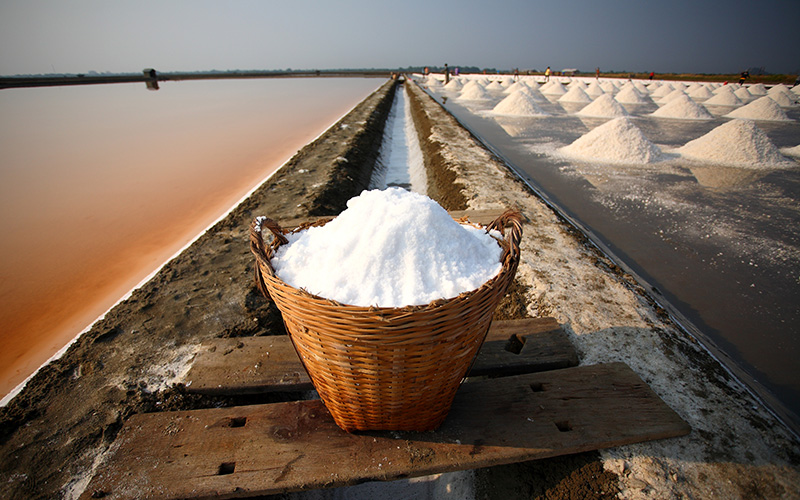
Salt has played a prominent role in the European exploration of North America and subsequent American history, Canadian history, and Mexican history, as well. The first Native Americans "discovered" by Europeans in the Caribbean were harvesting sea salt on St. Maarten. When the major European fishing fleets discovered the Grand Banks of Newfoundland at the end of the 15th century, the Portuguese and Spanish fleets used the "wet" method of salting their fish onboard, while the French and English fleets used the "dry" or "shore" salting method of drying their catch on racks onshore. Due to this early food processing, French and British fishermen became the first European inhabitants of North America since the Vikings a half-century earlier. Had it not been for the practice of salting fish, Europeans might have confined their fishing to the coasts of Europe and delayed "discovery" of the New World.
Salt motivated the American pioneers. The American Revolution had heroes who were salt makers and part of the British strategy was to deny the American rebels access to salt. Salt was on the mind of William Clark in the groundbreaking Lewis and Clark expedition to the Pacific Northwest. The first patent issued by the British crown to an American settler gave Samuel Winslow of the Massachusetts Bay Colony the exclusive right for ten years to make salt by his particular method. The Land Act of 1795 included a provision for salt reservations (to prevent monopolies), as did an earlier treaty between the Iroquois' Onondaga tribe and the state of New York.

Salt also had military significance. For instance, it is recorded that thousands of Napoleon's troops died during his retreat from Moscow because their wounds would not heal due to the lack of salt. In 1777, the British Lord Howe was jubilant when he succeeded in capturing General Washington's salt supply.
Similarly throughout history, salt has been subjected to governmental monopoly and special taxes. French kings developed a salt monopoly by selling exclusive rights to produce it to a favored few who exploited that right to the point that the scarcity of salt contributed to the French Revolution. Salt taxes long supported British monarchs and thousands of British people were imprisoned for smuggling salt. In modern times, Mahatma Gandhi defied British salt laws as a means of mobilizing popular support for self-rule in India. In recent years, the promotion of free trade through the World Trade Organization has led to abolition of many national monopolies, for example, in Taiwan.
Animals' taste systems are specialized for the niche they occupy in the environment. That includes us. As hunters and foragers of the dry savannah, our earliest forebears evolved a taste for important but scarce nutrients: salt and high-energy fats and sugars. That, in a nutshell, explains the widespread popularity of junk food and great foodie with not enough salt, too much salt and just the right amount of salt to deliver the perfect meal and meet the approval of Gordon Ramsay's taste buds.
THINGS YOU MAY NOT KNOW: What does the saying "Take it with a grain of salt mean?
“Take it with a grain of salt” Some believe that it originated in ancient times—specifically, in 77 A.D. from Pliny the Elder. It's believed he used the phrase when translating an antidote for poison, saying to take it with a grain of salt.
THINGS YOU MAY WANT TO SAVE: Antique salt shakers make a great collectibile, which dont take up too much space and are worth a few bucks.
ZENTRAVELER SAYS: Spice up your dishes by choosing 12 different salts which include: Table Salt, Kosher Salt, Himalayan Pink Salt, Sea Salt, Celtic Grey Sea Salt, Fleur De Sel, Flake Salt, Red Hawallian Salt, Black Hawallian Salt, Smoked Salt, Himlayan Black Salt, & Pickling Salt. If you pass out reach for the smelling salts for quick recovery.
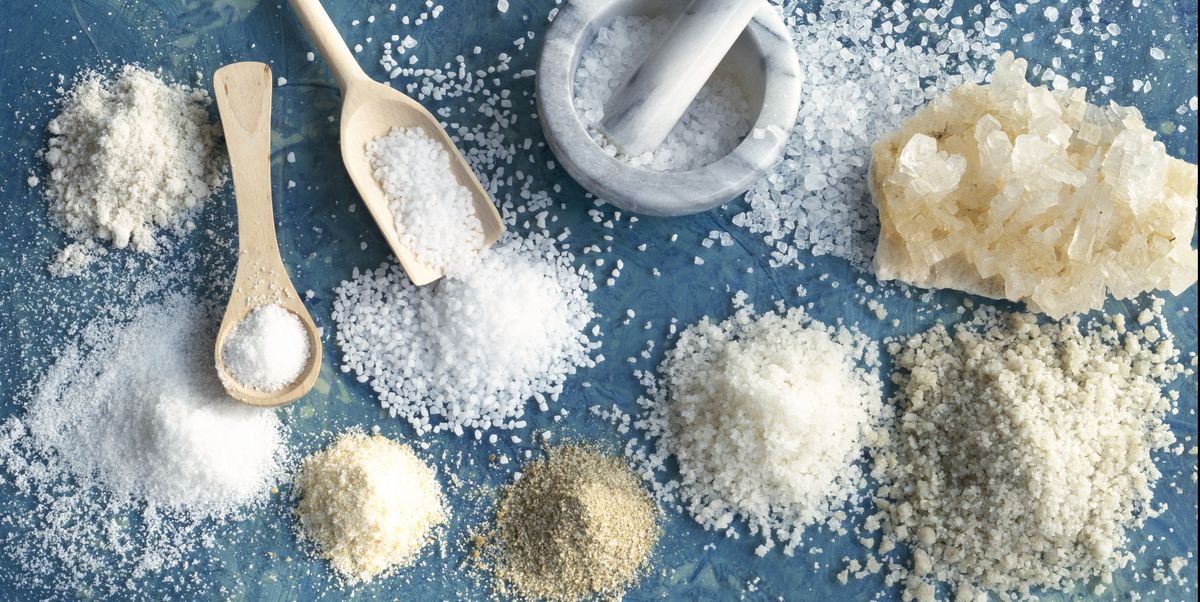
From here to Infinity is a relatively short ride! The next leg takes eons and eons as you fly through the Barycentric Dynamical Time Zone! …and on and on and on. Follow the Zentraveler Newsletter often for Travel, Health and Zen-like stories and such. Where else can you get a THREE IN ONE NEWSLETTER FOR THE PRICE OF FREE.

ZENTRAVELER IS A PERSONAL NEWSLETTER, DESIGNED TO GIVE TRAVEL, HEALTH, WRITING AND HUMOR INCLUDING HELPFUL HINTS WITH A ZEN LIKE QUALITY.
